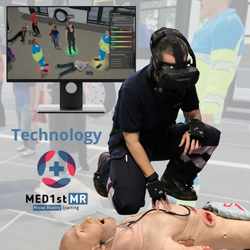MED1stMR is both a scientific research project and a technology project in which six technical partners collaborate in an agile development structure to develop a highly innovative mixed-reality training solution for medical first responders. As part of the project, over 200 paramedics and emergency medical technicians from across Europe will evaluate the solution in six weeks of training to provide feedback for the final development. This will adapt the training solution to the needs of the end users and create a solid foundation for commercial success after the completion of the grant project.
“Product development across 9 European countries and 18 partner organisations is challenging, but by using an agile end-user-centered research methodology, end users are continuously involved in the developments. This effectively brings together science, technology and the perspective of medical first responders right from the start,” says Helmut Schrom-Feiertag of AIT in Vienna, the project’s coordinator. Cross-sector end-user workshops, co-creation and design thinking methods were used to develop a common understanding of user requirements for the development of the solution. The user requirements are implemented on an ongoing basis by the technology partners, who are top companies in their industry.
The solution includes several technology components:
- Mixed reality training environment based on state-of-the-art XR technology with detailed performance measurement for improved team debriefing. Optical tracking for accurate positioning and motion analysis of up to 4 trainees simultaneously.
- Creation of realistic 3D environments and objects matching the scenarios (accident vehicles, injuries in different stages of treatment, realistic medical equipment such as ventilation bags, various uninvolved observers, realistic uniforms, etc.) to increase the trainees’ situational awareness.
- High-end medical simulation manikin for haptic and realistic experience in the virtual environment – multisensory feedback for pulse measurement, ventilation or similar.
- Wearable biosignal measurement device for easy real-time measurement of stress and its progression during training for conscious awareness of stress levels.
- A trainer dashboard for evidence-based decision-making, with visualised real time performance data.
- AI-supported scenario control to relieve trainers in the control of the training and real-time adjustment of the stress-triggering factors.
Taking stress into account in training promotes the resilience of the valuable emergency forces. This technology allows exercises to be conducted in a realistic and cost-effective way. Large-scale real-life exercises will not be replaced by this technology, but real-life exercises are cost- and resource intensive and based on that very rare. Therefore the MED1stMR solution enables additional realistic exercise sessions to better prepare first responders for emergencies.


